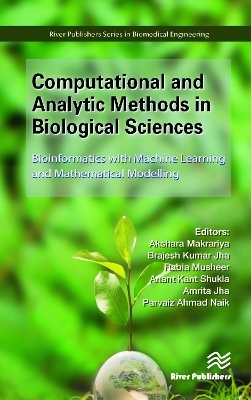
Computational and Analytic Methods in Biological Sciences
River Publishers (Verlag)
978-87-7022-695-0 (ISBN)
Despite major advances in healthcare over the past century, the successful treatment of cancer has remained a significant challenge, and cancers are the second leading cause of death worldwide behind cardiovascular disease. Early detection and survival are important issues to control cancer. The development of quantitative methods and computer technology has facilitated the formation of new models in medical and biological sciences. The application of mathematical modelling in solving many real-world problems in medicine and biology has yielded fruitful results. In spite of advancements in instrumentations technology and biomedical equipment, it is not always possible to perform experiments in medicine and biology for various reasons. Thus, mathematical modelling and simulation are viewed as viable alternatives in such situations, and are discussed in this book.
The conventional diagnostic techniques of cancer are not always effective as they rely on the physical and morphological appearance of the tumour. Early stage prediction and diagnosis is very difficult with conventional techniques. It is well known that cancers are involved in genome level changes. As of now, the prognosis of various types of cancer depends upon findings related to the data generated through different experiments. Several machine learning techniques exist in analysing the data of expressed genes; however, the recent results related with deep learning algorithms are more accurate and accommodative, as they are effective in selecting and classifying informative genes. This book explores the probabilistic computational deep learning model for cancer classification and prediction.
Dr Akshara Makrariya has a PhD in Mathematics from the National Institute of Technology (SVNIT) Surat, India, specializing in computational and bio mathematics. She completed her Post-Doctoral Research under the Young Scientist Fellowship (NPDF) programme, from the Science & Engineering Research Board (SERB), DST, and Government of India. Her research interest includes computational models to study temperature distribution in extended spherical and ellipsoidal shaped human organs, computational models to study thermal disturbances due to tumours, and their modelling with different numerical methods like fractional calculus, and the finite volume method, and by using optimization techniques. Dr Jha obtained his PhD in Mathematics in the year 2013 from the National Institute of Technology (SVNIT) Surat, India. His research area includes mathematical modelling and simulation of calcium dynamics in astrocytes, finite element modelling of biological problems, and fractional differential equations and their applications in physiological problems. Dr Rabia Musheer has a Doctorate in Applied Mathematics from Maulana Azad National Institute of Technology, Bhopal, India. Her research interests include mathematical machine learning and data science application of mathematical modelling and optimization, soft computing, big data and bioinformatics. Dr Anant Kant Shukla has a Doctorate from the VIT Vellore and CSIR-Fourth Paradigm Institute, Bengaluru. His research is in the area of analytical solutions and nonlinear systems. Dr Jha obtained his PhD in Mathematics in the year 2013 from National Institute of Technology (SVNIT) Surat, India. Her research area includes mathematical modeling and simulation of calcium dynamics in neuron cell, and finite element modelling of biological problems. Dr Parvaiz Ahmad Naik is working as Assistant Professor in Mathematics at the School of Mathematics and Statistics, Xi’an Jiaotong University P. R. China. He received his PhD in Applied Mathematics (Mathematical Biology) in 2015. His interest areas include differential equations, mathematical biology, fractional calculus, calcium dynamics, transmission dynamics of infectious diseases, etc.
Preface Participants of the Reviewing Process 1. Optimal Homotopy Analysis of a Nonlinear Fractional-order Model for HTLV-1 Infection of CD4+ T-cells 2. An Optional Additive Randomized Response Model Smearing Optimization Technique 3. Challenges of Microarray Data Analysis 4. Modeling and Analysis of an SEIVR Model for the Transmission Dynamics of HBV Epidemics with Optimal Control 5. Support Vector Machine Classification of Biomedical Data with a Novel Wrapper Based Machine Learning Approach 6. New Nature Inspired Framework Using Hybrid Gene Selection Techniques for Microarray Data Classification 7. Deep Learning Classification and Prediction with Metaheuristic Algorithm for High Dimensional Biomedical Datasets 8. Soft Computing Method for Machine Learning Classification of Microarray Gene Expression Data 9. Fractional Modelling of Calcium Distribution in Hepatocytes 10. Numerical Modelling and Simulation of Calcium Distribution in Astrocytes 11. Analytical Estimated Solution of the Modelling of Tumor Polyclonality 12. Impact of Thermal Radiation and Nanoparticle Shape on Au/Al2O3-blood Nanofluid in a Permeable pipe using HAM 13. Series Solution for Thermal-diffusion, Diffusion-thermo Effects on MHD Flow in a Porous Channel with Moving/stationary Walls using HAM 14. The Numerical Solution of Prolate and Oblate Ellipsoidal Shaped Bio Heat Equations using the Finite Element Method 15. Numerical Analysis of Heat Flow in a Human Body in a Cold Environment 16. Computational Study of Breast Fibrosis
| Erscheinungsdatum | 20.07.2023 |
|---|---|
| Zusatzinfo | 34 Tables, black and white; 77 Illustrations, color; 10 Illustrations, black and white |
| Verlagsort | Gistrup |
| Sprache | englisch |
| Maße | 156 x 234 mm |
| Gewicht | 660 g |
| Themenwelt | Medizin / Pharmazie ► Physiotherapie / Ergotherapie ► Orthopädie |
| Technik ► Elektrotechnik / Energietechnik | |
| Technik ► Medizintechnik | |
| Technik ► Umwelttechnik / Biotechnologie | |
| ISBN-10 | 87-7022-695-4 / 8770226954 |
| ISBN-13 | 978-87-7022-695-0 / 9788770226950 |
| Zustand | Neuware |
| Haben Sie eine Frage zum Produkt? |
aus dem Bereich


